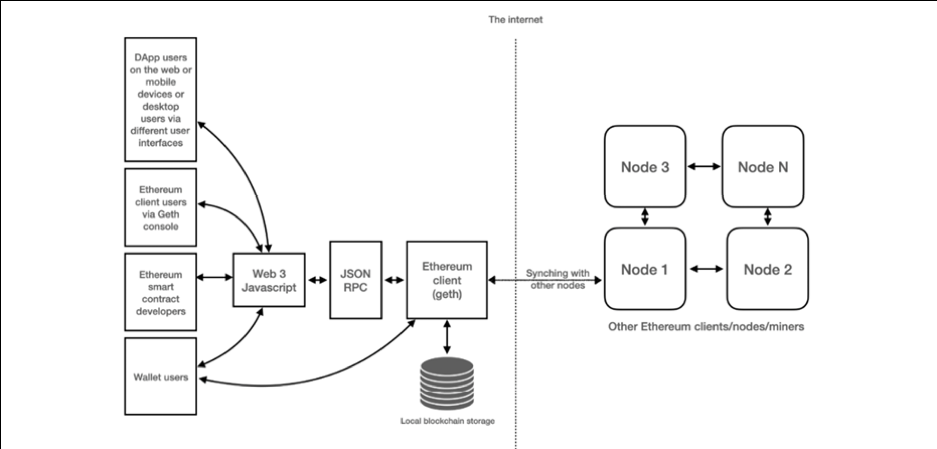Contents
As blockchains evolve rapidly and increase capacities, more and more decentralized applications are being built to leverage the technology. While dApp’s frontend development is not different from what IT professionals are accustomed to, the backend part involving blockchain nodes still raises questions.
In this guide, we’ll break down how to integrate blockchain as a backend for applications with a specific focus on Ethereum APIs, the easiest way to build Web3 applications.
Key takeaways
- Ethereum is very welcoming toward application developers willing to contribute to the ecosystem;
- ETH nodes are the backbone of the network as they perform massive amounts of work for validating transactions and sustaining smart contract performance;
- To build high-quality dApps on Ethereum, developers need to take care of setting up a connection to blockchain nodes to fuel the app functionality;
- Ethereum APIs enable seamless interaction with the ETH chain without needing to spin up a node.
Explaining Ethereum nodes
First and foremost, let’s define what are nodes and how they’re involved in the dApp building process.
A blockchain node is what constitutes any network. Thousand of computers located everywhere around the globe run node software and communicate with each other in order to maintain the network functionality.
Specifically, nodes are busy with decentralized record-keeping and verification as well as consensus management. Full, archival, and lightweight nodes characteristic of the Ethereum protocol will to a different extent perform this functionality.
Decentralized applications built on ETH serve as interfaces for users to interact with the blockchain: initiate transactions and retrieve data such as account balances or ETH network stats, to name a few.
Since all interactions with the network are established via nodes, developers should consider different ways of approaching and connecting them to Web3 applications.
How to apply Ethereum API to dApp development
Ethereum node clients support RPC API connections to authorize dApps to read blockchain data and send updates to the network. This connection can be configured via a self-hosted node or RPC endpoints offered by Web3 infrastructure services.
Running a full blockchain node for this purpose is not a popular choice among developers as this path implies you have fairly powerful hardware and enough expertise to guarantee due maintenance.
As an alternative, node service providers offer ready-made Ethereum API to include in a dApp’s codebase and enjoy flawless connection with the network.
Advantages of using GetBlock’s RPC nodes
GetBlock is a platform specializing in maintaining endpoints for over 50 popular protocols, Ethereum, Bitcoin, BNB Chain, and Tron included. Service users get access to the mainnet and testnets of select blockchains via private APIs that are ready to use without figuring out node self-maintenance.
To start using Ethereum APIs, users are required to register on the platform. After a free sign-up procedure, every client is given a pack of 40,000 requests renewed daily at no charge.
The next step is to decide on the endpoint’s type:
Shared nodes
This type of service is perfectly suitable for launching applications on testnets to exclude the possibility of bugs and avoid spending real ETH before inviting the public to the mainnet version. In this case, users share an API with other platform clients and can send blockchain requests capped at 60 requests per second rates, which allows for saving some budget for future scaling of a dApp.
Dedicated RPC nodes
This tariff includes setting up a private server for one client taking the customer’s specific requirements into consideration. A variety of Ethereum API methods and desired node locations are also configurable. Private RPC endpoints will guarantee scalable network bandwidth and unlimited request rates.
By choosing any of the given services, users will receive top-notch support to assist with every step of implementation.
Summary
Ethereum boasts the largest developer community and provides all the necessary toolings to smoothly launch dApps that will benefit from protocol security and smart contract support. The emergence of node service providers aids developers willing to streamline the connection between ETH blockchain nodes and their dApps with ease. Eventually, one does not need to set up a separate node to create a crypto-enabled product or service



Leave a Reply